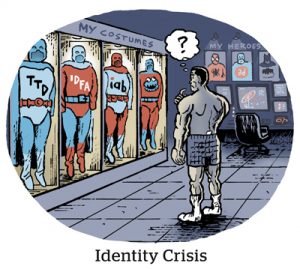 “The Sell Sider” is a column written by the sell side of the digital media community.
“The Sell Sider” is a column written by the sell side of the digital media community.
Steven Shure has surfed big subscription waves in the past. For 20 years, he led the subscription program for Time Inc. magazines. Then he joined Amazon as VP of a little project called Prime.
He oversaw various Amazon consumer and B2B marketing programs for 15 years until last month when he joined the search engine startup Neeva as chief business officer.
For Neeva, the attraction is obvious. The company hopes Shure can capture subscription lightning in a bottle once more – this time with a search engine the company plans to offer at approximately $5 per month.
But getting people to pony up for search, a service they’re accustomed to getting for free, won’t be easy. Neeva, in effect, needs to invent a brand-new category: the search engine subscription.
“The common thread through much of my career is convincing customers and businesses to pay a recurring fee for a great product,” Shure told AdExchanger.
Shure is not the only heavy hitter involved with Neeva. In addition to CEO and co-founder Sridhar Ramaswamy, who ran the Google Search business for years, Neeva’s ranks include top search and recommendation product leaders from Chrome, YouTube, Snapchat and Facebook.
AdExchanger spoke with Shure about his plan to translate the Neeva vision into a viable business that collects thousands, or eventually millions, of monthly credit card payments.
AdExchanger: What attracted you to the new role?
STEVEN SHURE: I knew Sridhar Ramaswamy when he was at Google. My teams at Amazon were some of the largest Google advertising customers for many years. He and I were reintroduced by a mutual friend.
I was taken by Neeva’s mission, by the opportunity and by the challenge.
What is your vision for turning Neeva into a profitable business?
I’m going to give the high-level answer which, I apologize, is a bit mom-and-apple-pie. My goal is to bring a level of excellence and expertise to the business side to match the product we’re delivering. The engineering and product team is already well along a path toward providing the best search experience.
It’s a difficult task ahead for us, to invent a category and to teach people that there’s value in paying for something that they perceive as free.
You can join Prime, for example, agree to let Amazon charge your credit card and the products start arriving. But Amazon has an existing customer base and credit cards and opportunities in the checkout flow to ask people to try Prime. Neeva doesn’t have those things.
Neeva also faces a strong existing player with over 90% revenue share, and whose business model is dead-set against making it easy for customers to use other search engines. We’re going to have to teach people the value of Neeva and find ways for them to subscribe easily and commit to the product in a frictionless fashion.
Neeva is still free to use right now?
It’s free to use, but not without an account.
Is there a strategy for how to make that transition?
That is one of the core challenges.
It’s a chicken-and-egg problem, because in the fullness of time we will have to charge. And yet we also have to generate a fair amount of trial and word of mouth. As with many tech startups, there’s a challenge to walk that fine line between allowing people to sample your product and growing your user base and influence, and knowing when to shut off or at least turn down the spigot to only those who subscribe.
That’s not a very satisfying answer, but I don’t have a timeline yet.
Do you envision revenue streams other than subscriptions?
I believe there will be other revenue channels, but we will not consider revenue channels that are advertising based or de facto advertising. An ecommerce revenue stream in which Neeva places links or results higher in the search rating for financial reasons rather than consumer reasons will not be considered.
As a hypothetical example, would Neeva join a retailer affiliate program?
We will not consider affiliate partnerships. Period.
What you see when you search on Google are ads and affiliate links – and you can’t even tell that they’re not organic results.
Neeva will not participate on terms like that. I won’t draw the line and say that Neva wouldn’t partner with a retailer in some way. There might be ways to form a financial relationship. Yet that specific model is exactly what Neeva won’t do. Neeva will not sell the user as the product to anyone.
But I’m not thinking about that at all right now. Our focus is the subscription business and to figure out how best to grow the user base and charge customers.
Has Neeva done any advertising itself?
We’ll be dipping our toe in the water. We’re certainly not opposed to it. We need to build this business, and marketing does work. Maybe it’s ironic that Neeva is all about not being constantly marketed to, but that doesn’t mean we’re philosophically against advertising the products we create.
People who use search engines can be found on search engines. People who download applications can be found in app stores. These are not surprising facts. It’s just to say that we’re going to fish where the fish are.
Are there any existing partnership opportunities you can point to?
I’ve been in a small set of Neeva partnership discussions already, and I’m really excited about these conversations.
They have the feeling of the earliest days of Prime. It’s hard for people to put themselves back in this frame of mind because of what Amazon is today, but in 2006 everyone was rooting for Amazon. Amazon was this wonderful upstart. And people really rooted for Prime. They wanted to tell their friends about how transformative it was. This was before the days when Amazon was seen as this evil empire.
People loved to approach us about how they might work with us to improve Prime, and I get the same sense in the partnership discussions with Neeva.
What’s Neeva’s pitch to potential partners?
Many companies have a complicated relationship with Google. They see it largely as a necessary evil. We’ll benefit from having a share of those customers who don’t always have to pay a tax in the form of advertising to get users to visit their site. Companies have to buy ads on their own brand name, for goodness’ sake.
Businesses will see a world in which there is less market power concentrated in one place – and that this world will be better for them.
This interview has been edited and condensed.














